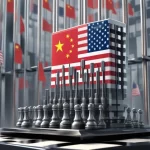Nvidia Denies China’s H20 Chip Backdoor Claims Amid US-China Tech War Fallout

Nvidia Slams Chinese Backdoor Claims on H20 AI Chips Amid Geopolitical Chaos
Nvidia, the undisputed heavyweight of AI hardware, is caught in a firestorm as China’s Cyberspace Administration (CAC) accuses its H20 chips of hiding “backdoors” that could allow unauthorized remote access or control. With US-China tech tensions already at a breaking point, Nvidia’s sharp denial is merely a skirmish in a broader war over national security, surveillance fears, and raw geopolitical muscle—one with sneaky implications for the crypto and blockchain world.
- Core Accusation: China claims Nvidia’s H20 AI chips may contain hidden vulnerabilities for remote access, threatening security.
- Nvidia’s Pushback: A staunch denial, asserting no backdoors exist and cybersecurity is a top priority.
- Wider Stakes: US bans, rare earth deals, and mutual distrust fuel a clash that could ripple into crypto mining.
China’s Security Alarm: Backdoors or Bogeyman?
The clash erupted during a closed-door confrontation between Nvidia and Chinese regulators, where the CAC flagged potential security holes in the H20 chips. These aren’t just any chips—they’re high-performance computing powerhouses, akin to a turbocharged engine for heavy-duty tasks like AI model training or, for our crowd, crypto mining. A “backdoor,” in tech speak, is a hidden flaw or intentional feature in hardware or software that lets someone bypass security—imagine a secret entrance to your digital vault. For China, the idea that US-made tech, especially chips powering critical infrastructure like data centers or military systems, could harbor such vulnerabilities is a nightmare. They worry it’s an open invitation for espionage or sabotage, as highlighted in recent updates from China’s Cyberspace Administration.
Beijing’s skepticism isn’t new. They’ve got a history of slamming the door on American tech—think the 2023 ban on Micron memory chips over national security or their ongoing side-eye at Intel products. But let’s flip the script for a second. China’s own playbook on tech control, from the Great Firewall to a digital yuan designed for citizen tracking, doesn’t exactly scream “trust us.” Are they genuinely spooked by Nvidia’s chips, or is this a convenient stick to beat US tech dominance while hyping their own alternatives? It’s a fair question, and one that cuts through the noise of geopolitical posturing.
Nvidia Fires Back: No Backdoors, End of Story
Nvidia isn’t backing down from the allegations. Their response was blunt and to the point:
Cybersecurity is critically important to us. Nvidia does not have ‘backdoors’ in our chips that would give anyone a remote way to access or control them.
That’s a hard no, a clear shot at dismissing any notion of hidden access points. They’re staking their reputation on the integrity of their hardware. But let’s not swallow this whole just yet. Tech giants have rolled over for government demands in the past—remember PRISM, where big names like Apple and Google played ball with NSA data snooping? With recent whispers from the White House about embedding location-tracking or verification features into chips sold abroad (supposedly to stop them from landing in “wrong” hands), China’s got a reason to squint. Let’s call it what it is: a surveillance fantasy dressed as national security, as discussed in proposals on semiconductor tracking. If the US is pushing that agenda, can we really take Nvidia’s word at face value, or are they caught in a pressure cooker of their own?
Geopolitical Slugfest: Chips as Weapons
Step back, and this Nvidia drama is just another round in the ugly US-China tech cold war. The US has been dead-set on throttling China’s access to cutting-edge hardware, terrified it’ll fuel military AI or state surveillance systems. Earlier this year, the Department of Commerce banned Nvidia from selling H20 chips to China—a blow that cost billions in a market ravenous for AI tech. We’re talking serious demand; reports cite Chinese orders of 300,000 H20 chipsets through TSMC (Taiwan Semiconductor Manufacturing Company, a global chip-making titan). That ban was flipped in July 2025 after a rare earth minerals deal—China holds the cards on much of the world’s supply of these chip-making essentials, giving them leverage. The reversal tied to high-level US-China negotiations, including a meeting involving Jensen Huang and Donald Trump, lays bare how tech firms are just chess pieces in a brutal economic and strategic fight.
China’s not stopping at security gripes either. They’ve got Nvidia under an antitrust microscope via the State Administration for Market Regulation, probing suspected anti-competitive moves from the 2020 Mellanox acquisition. It’s a two-front assault—security claims on one side, market violations on the other. Analysts are split on China’s endgame. Tilly Zhang from Gavekal Dragonomics reckons Nvidia’s chips are “dispensable” now, a bargaining chip as China builds domestic options like Huawei’s Ascend AI series. Meanwhile, Charlie Chai of 86Research sees this as symbolic retaliation to US policies, noting China still needs Nvidia for domestic AI research. Either way, Beijing’s swinging regulatory hammers with precision, and Nvidia’s taking the hits, a dynamic explored in analyses of the US-China tech war.
Nvidia’s Balancing Act: Schmooze or Lose
Nvidia isn’t twiddling its thumbs. CEO Jensen Huang launched a charm offensive in July 2025, heading to China to praise their AI progress and glad-hand officials. It’s a high-wire act—reassuring Beijing that H20 chips aren’t spy gadgets while staying loyal to US ambitions of AI dominance. Huang’s sweet-talking a dragon that could still snap, and whether this buys goodwill or just delays the inevitable is anyone’s guess, with community discussions on platforms like Reddit shedding light on these security concerns.
Here’s the contrarian angle: Nvidia’s damned either way. Bend too far for China, and they risk US wrath—think more bans or tighter screws. Stonewall Beijing, and they lose a colossal market while inviting harsher crackdowns. For those of us rooting for decentralization, there’s a bitter pill here. Nvidia’s a centralized behemoth. Their grip on high-performance hardware means they hold the keys to tech that powers our blockchain networks. If governments can muscle them into backdoors or tracking, what stops that same overreach from creeping into our space? It’s a sobering thought, with questions about risks of backdoors circulating widely.
Crypto Caught in the Crossfire: Mining at Risk
For the Bitcoin and blockchain faithful, this isn’t just a tech squabble—it’s personal. Nvidia’s H20 chips, with their insane processing muscle, aren’t just for AI; they’re vital for crypto mining and decentralized apps. Sure, Bitcoin mining leans on specialized ASICs now, but Nvidia GPUs still dominate altcoin mining and hybrid setups. They’re also key for developers building compute-heavy decentralized platforms. China, despite past crackdowns, remains a shadowy powerhouse for mining—estimates peg 10-15% of Bitcoin’s global hash rate to Chinese operations, often underground, with plenty relying on Nvidia gear for altcoins or research, a connection detailed in reports on the tech conflict’s impact on crypto mining.
If China ramps up this H20 feud into bans or restrictions, the fallout could sting. Hardware supply chains might choke, driving up costs for miners everywhere. Smaller altcoin networks could see hash rate dips, weakening security. Decentralized app development needing top-tier computing power might stall. And here’s the kicker: if US-proposed tracking features become reality, could miners or node runners end up using chips that snitch to Big Brother? For a community built on privacy and freedom, that’s a gut punch. Past tech bans, like the 2019-2020 Huawei mess, already disrupted mining rig supplies and spiked costs—Nvidia’s saga could be a nasty rerun.
But let’s play devil’s advocate on the upside. Could this chaos spark innovation? The crypto space thrives on disruption. If centralized hardware giants like Nvidia become liabilities, maybe it’s the push we need for open-source mining gear or decentralized manufacturing. It’s a long shot, but isn’t busting the status quo our whole deal? This mess screams one truth: reliance on corporate tech lords is a weak spot in our decentralized dream, a perspective echoed in industry forums discussing H20 chip modifications.
Where’s This Heading? A Tech Standoff with No Winners
So, what’s the lay of the land? Nvidia’s trapped between superpowers, juggling compliance and market survival while fending off trust-damaging accusations. China’s security drumbeat might be legit, but their hunger for advanced tech—Nvidia’s or otherwise—might curb drastic action. The US keeps throwing punches with export controls and tracking schemes, obsessed with staying the AI top dog. It’s a messy brawl, and H20 chips are just today’s battleground.
For the crypto and Bitcoin crowd, this is more than headlines—it’s a red alert. If hardware can be weaponized in superpower games, our fight for financial sovereignty isn’t as ironclad as we think. Maybe it’s time to ditch dependence on centralized giants and forge our own path. Because if governments and corporations keep playing chess with our tech, shouldn’t we be building our own damn game?
Key Questions and Takeaways on Nvidia’s H20 Chip Row and Crypto Fallout
- What’s China alleging about Nvidia’s H20 AI chips?
China’s Cyberspace Administration claims these chips might hide backdoors for remote access or control, posing risks to national security and critical systems. - How is Nvidia countering these accusations?
Nvidia outright denies the claims, with a spokesperson affirming cybersecurity as a priority and stating no mechanisms exist for unauthorized access. - Why does China distrust US tech like Nvidia’s hardware?
Beijing suspects foreign tech could enable spying or sabotage, a fear stoked by US talks of embedding tracking features in chips for “security.” - How do US policies escalate this Nvidia-China tension?
Export bans on H20 chips and tracking proposals deepen mistrust, placing Nvidia at the epicenter of a fierce US-China tech rivalry. - What’s the risk to Bitcoin and crypto mining from this clash?
Nvidia chips fuel mining and decentralized tech; Chinese restrictions could disrupt supply, raise costs, and weaken network security for Bitcoin and altcoins. - Could this drive crypto toward decentralized hardware innovation?
Damn right—it’s a wake-up call to cut ties with centralized tech giants and push for open-source or community-built solutions for mining and beyond.



